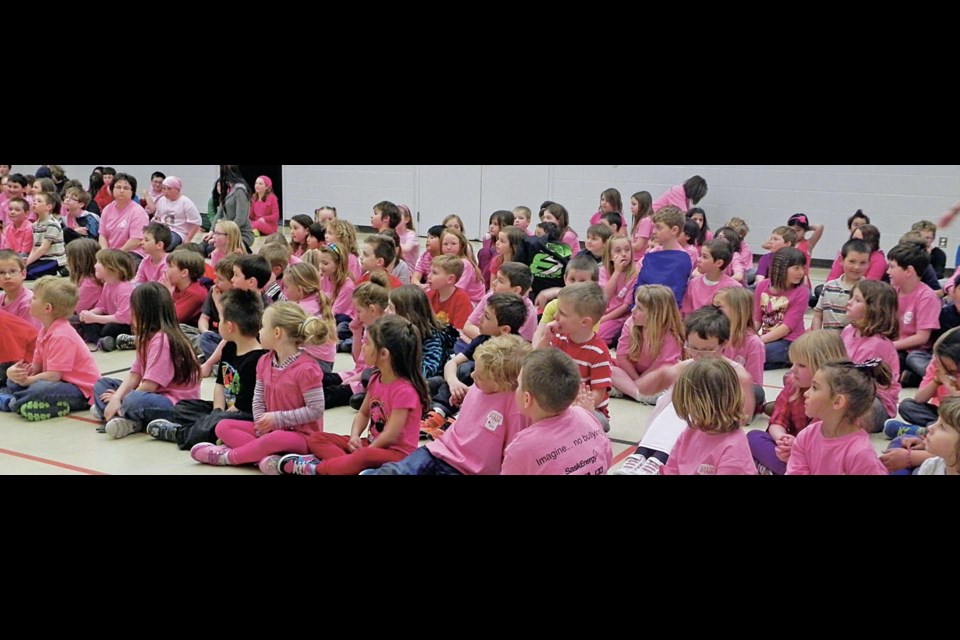UNITY – Pink Shirt Day is approaching, with many individuals, schools and businesses supporting the anti-bullying movement. With people donning their various shades of pink shirts, others know what cause they are standing up for, but how many know the story behind the message?
On the first day of the 2007-08 school year, Chuck McNeill was entering Grade 9 at Central Kings Rural High School in Cambridge, N.S. He was wearing a pink polo shirt, which catapulted him into the centre of being bullied and harassed. It was not common to see a boy wearing such a colour in the small East Coast community, let alone in the halls of its schools.
While most students ridiculed young McNeill, two older students in Grade 12 saw how it was affecting the young man. David Shepard and Travis Price, along with some of their peers, couldn’t fathom why the students were tormenting a classmate. They decided to take a stand, purchasing 50 pink tank tops and messaging schoolmates to don the vibrant colour the next day at school. The next morning, students were able to grab a pink shirt if they did not have one, flooding the hallways with a sea of pink. McNeill was in disbelief, seeing all the students supporting not only him but standing up to the bullies as well. The Globe and Mail covered the story when it first erupted, quoting Price “McNeill’s face spoke volumes, like a huge weight was lifted off his shoulders.”
The rose-coloured protest within the school garnered attention from then premier of Nova Scotia, Rodney MacDonald, who proclaimed the second Thursday of September, coinciding with the start of each school year, as Stand Up Against Bullying Day.
The following year, the province of British Columbia announced that Feb. 27 would be Anti-Bullying Day, which prompted the Boys and Girls Clubs of Canada to create pink T-shirts for 2009, with slogans “Bullying Stops Here” and “Pink Shirt Day” for the annual reminder about the effects of bullying.
Since the inception of Pink Shirt Day, more than $2.8 million has been distributed to youth anti-bullying programs throughout Western Canada. More than 110 countries took part in Pink Shirt Day activities in 2022 and more than 493,000 pink shirts have been sold.
Statistics Canada conducted a Canadian Health Survey on Children and Youth (CHSCY) in 2019, which determined that roughly 80 per cent of participants go online weekly. With 60 per cent of those admitting they visit social media platforms multiple times a day, slightly more than 50 per cent reported they used video and messaging apps at the same level of use. This amount of online use exposes many young people to cyberbullying.
During the same year, one in four teenagers was the target of cyberbullying, with the most common forms being threats or insults either online or via text message. It was noted the rate of cyberbullying increases as students get older, with 20 per cent at age 12 to 27 per cent by age 17.
What most don’t realize is that bullying doesn’t only impact one’s mental health, but physical health as well. Seventy-two per cent of the youth who reported being the victim of bullying on a monthly or more basis said their lives were stressful, unlike those who experience bullying a few times a year (55 per cent) or are not bullied at all (44 per cent). Those who are highly victimized also reported difficulties going to sleep, headaches, stomach aches or backaches more frequently.
Seven years after the initial Pink Shirt Day in Nova Scotia, Saskatchewan’s education minister at the time, Don Morgan, announced April 9, 2014, would be known as Red Cross Day of Pink for the province. Many schools took part in the inaugural day, showing their support and sending a message to those who taunt others. It was estimated that more than 20,000 Saskatchewan residents would be wearing various shades and hues of pink. Later in 2016, Saskatchewan altered the Day of Pink in April to the last Wednesday of each February, to match other western provinces.
With one in five kids affected by bullying, the message hits close to home for some who wear the cheerful colour. Local schools have participated in the annual peaceful protest each year since 2014.
Each year, the local schools continue to show their support. St. Peter’s School in Unity has also lined up a special assembly with various classroom activities that talk about the anti-bullying movement. Local businesses, such as the Delta Co-op, have also been known to swap out their red shirts for the rosy tone, reminding everyone that bullying is not OK. An annual donation is made to the UCHS Activate Club from the Unity Wilkie Press Herald. The monies donated is a portion of the advertising sales for the Pink Shirt Day feature. Last year’s donation to Activate was used to provide a discounted price to the Better Together shirts the school has available for sale.



